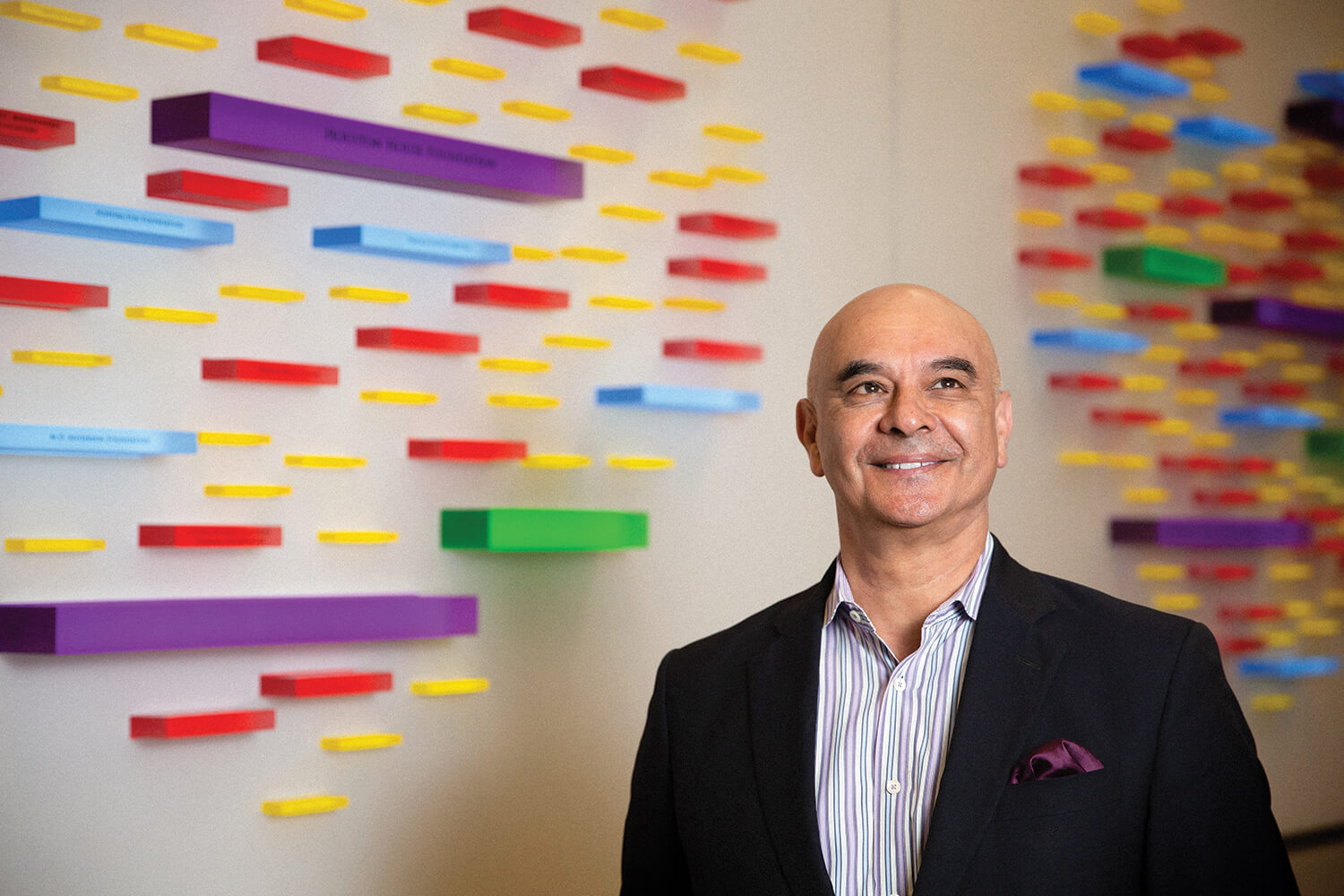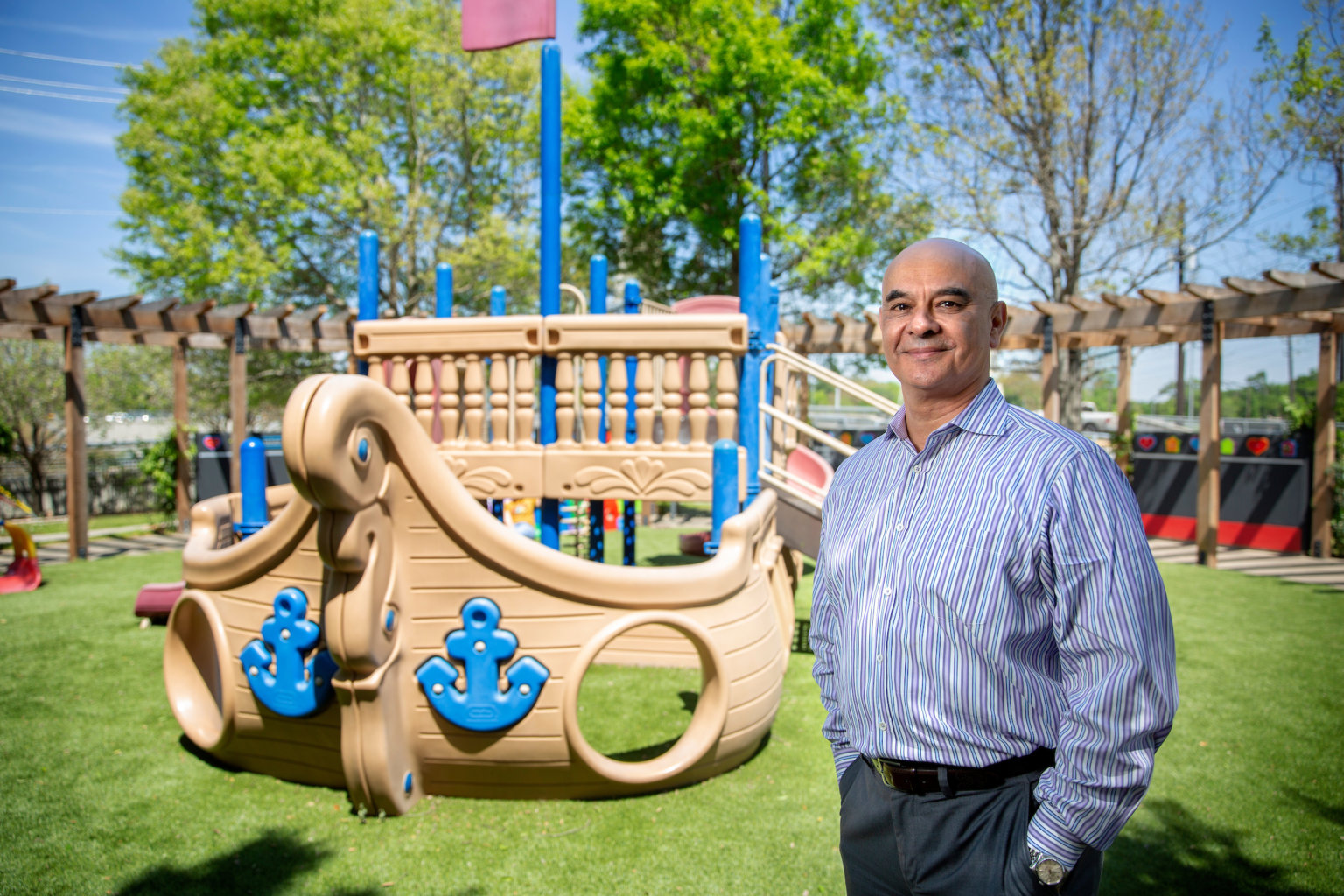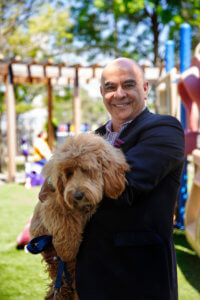Major General Rick Noriega leads Ronald McDonald House Houston to greater impact

MAJOR GENERAL RICK NORIEGA has been CEO of Ronald McDonald House Houston for two years following an impressive career in public service. He spent a decade in the Texas legislature representing Houston’s east side, served in Afghanistan and oversaw the conversion of the George R. Brown Convention Center into a massive shelter as Houston welcomed Hurricane Katrina evacuees in 2005. The native Houstonian discusses how his experiences have influenced his leadership and what’s next for Ronald McDonald House Houston.
Q | During your time in the Texas legislature, you were the primary author of the Texas Dream Act, which provides in-state college tuition for undocumented immigrants who have lived in the state for three years before graduating from high school or receiving a GED and are seeking legal status. How did that come about?
A | That’s what I’m going to have on my tombstone. Being a person called to public service, sometimes it’s as simple as someone calling your office to say they can’t get into Houston Community College because they’re an immigrant kid—a Salvadoran refugee—and the college is trying to charge international tuition. He was trying to do the right thing and go through the process. He wanted to be an aviation mechanic. His dream was to work for Boeing. I thought: This is probably not unusual—especially in the district I represented [East End/Ship Channel area]—and how many other kids are affected? I had the University of Houston do a survey by a demographer asking some questions to see the depth of the issue. The political dynamic at the time in Texas was that Rick Perry had ascended to the governorship from lieutenant governor after George W. Bush became president, so he had yet to run a race for governor. Under the radar in 2001, the governor signs the bill.
Q | So, what happened to the young man who sparked the Texas Dream Act?
A | Rosendo Ticas is an aviation mechanic today. He’s married and has three kids. He owns a house and a rental house. He became a citizen and voted in the last presidential election.
Q | Readers also might remember your role in Houston’s response to Hurricane Katrina in 2005.
A | At the time, I was on leave from deployment in Afghanistan and tri-hatted, serving as a state representative, a traditional Guardsman and working for CenterPoint Energy in the economic development department. I had been home for a few weeks in the summer of 2005 burning my leave time going to the beach, then Katrina and Rita hit. The Astrodome was about filled up and Mayor Bill White decided to open up the convention center. I was invited to the meeting and they said I was going to run things as incident commander. I walked through the convention center around 10 a.m. and by 6 p.m., buses were rolling in. People were wet and everything, coming directly from New Orleans and the Superdome. It’s pretty amazing what this city is capable of. It was remarkable.

Major General Rick Noriega, CEO of Ronald McDonald House Houston, on the organization’s playground.
Q | How did you connect with Ronald McDonald House Houston?
A | In civilian life, I had retired from another nonprofit in San Antonio, AVANCE, and returned to Houston in May 2017 to take care of my mother, who will be 88 in September. She was by herself and my siblings were out of town. I had a little over a year before my Army retirement and I had made brigadier general, so I was being asked to do more. I was going to turn over rocks for a while in Houston when I got approached for this opportunity in the spring of 2017. I started in July 2017.
Q | You began your tenure by guiding the expansion of Holcombe House, the temporary residence for sick children and their families that now offers 70 rooms. A month later, Hurricane Harvey hit amid construction. How did you manage that crisis?
A | We set a decision point for families about two days out: Are you going to go to the hospital, go home, stay with a friend or are you going to stay here with us and wait it out? We got in our workroom, called in all our employees, pulled out our emergency plan and went through it line by line. Who’s going to do what? Who’s going to be where? All the generators were gassed up and we moved the [portable toilets] out so that they wouldn’t become projectiles. I headed back to Austin in my role with the Texas Army National Guard and we huddled on calls every morning. The water came up on the back patio, if that. Topographically, we are on the high point of the Texas Medical Center. We were super-proud of the fact that we maintained operations during Harvey. We were pretty much isolated for 72 hours, but none of the kids through that period of time missed an appointment or a treatment. The ones that were still here, we were able to help. We were also super-fortunate to finish construction on time and under budget.
Q | Have those successes influenced your ambition for Ronald McDonald House Houston?
A | With our board, staff and volunteers, I have learned that we can walk and chew gum at the same time. We were totally operational in the middle of a construction project and a major hurricane. We are changing our advancement model to feed the beast with 40 percent more capacity. As we look at our new normal serving more families and children, I feel confident that we are going to do the operational things better than anybody else. One of the principles of the military is that you’re always improving your position. We are open to changes and new ideas.
Q | You completed your military service last year. Explain your honorary boost from brigadier general to major general— from one star to two stars.
A | I retired from the Army in February 2018. It’s a ceremonial promotion at retirement honoring you at the next highest rank.
Q | What specific skills do you transfer from the military to your current role?
A | People skills—liking people, respecting people, learning from people. It’s given me the knowledge base to deal with a lot of different things. In this position, you get to see the most amazing children—the beauty, the resilience, the love— every day. I am still learning, having fun and feeling incredibly blessed.
Q | How does Ronald McDonald House Houston help families beyond shelter and food?
A | Our intervention in this social space, which is family-centered care, helps them to get better and to be better. Our intervention of caring for families beyond their basic needs helps alleviate stress and helps them with all types of collateral things they may be dealing with, such as mental health and support systems. That intervention helps improve recovery times and hospital stay times and it helps the family to be healthier and stay together through an incredible crisis to keep them whole.

Major General Rick Noriega, CEO of Ronald McDonald House Houston, with Mogie, the house’s canine comfort ambassador.
Q | You have expressed an interest in collecting data to determine if staying at Ronald McDonald House Houston during treatment improves outcomes for patients. How far along is that project?
A | We have the assistance of a grant from the Baxter Trust. That gift allowed us to embark on a research strategy we are pursuing as a part of our long-term sustainability plan. It allowed us to do our self-evaluation by collecting our own numbers in family activities, early childhood development, nutritional data— understanding what we do. I believe, in the greatest medical center in the world, we should be at the forefront of understanding family-centered care and how what we do makes a difference. Doctors will report that patients say that it’s very import- ant for them to stay at Ronald McDonald House, but I want us to have empirical evidence to be able to demonstrate that it helps families recover.
Q | With 70 beds, is Holcombe House one of the largest Ronald McDonald House facilities in the country?
A | We’re in the top 10 percent in the United States. We have family rooms in MD Anderson Cancer Center and Texas Children’s Hospital. We also have an embedded 20-bedroom house in Texas Children’s and we have sleep rooms in Children’s Memorial Hermann Hospital. Parents may need to sleep over to be trained by the nurses on how to care for the child or for grieving purposes.
Q | What do you wish people understood better about Ronald McDonald House Houston?
A | We’re not funded by Ronald McDonald. We are almost entirely funded by local community grace and benevolence. We get minuscule federal money for a family that might qualify for Medicaid, like $25 a night, but the cost for a family to stay here is about $200 a night for the food, lodging and transportation. There are a whole lot of other restrictions and issues. You can’t be a resident of Harris County or a county that abuts Harris County. We are funded through grants, primarily from our local foundations and family foundations that we’ve had relationships with for 40 years. We have our Boo Ball, which is our famous Halloween event, and our golf tournament—the Ronald McDonald House Cup—and our Spirit of Hope volunteer luncheon. Then we have a run, the Trafigura Run for the House, which is sponsored. I want folks to know that we receive occasional support from Ronald McDonald House Charities. Otherwise, everything’s local. We want the local community to know that we need them. I look at us as a real symbol of this city, our core values and what’s best about Houston. That’s what makes me proud as a native Houstonian.
Q | Does McDonald’s contribute?
A | Our local restaurant owners and operators do—but that’s still local.
Q | You’ve been in leadership positions for decades, but what does it feel like being a CEO?
A | If I ever need a dose of reality, I go play with the kids or Mogie [the 1-year-old Australian Labradoodle who lives at Ronald McDonald House Houston and serves as its canine comfort ambassador]. The stories are very humbling. This place has an incredible history and because of the foundation that we’re on here at the Texas Medical Center, the best days are yet to come.
Major General Rick Noriega was interviewed by Pulse assistant editor Cindy George. The conversation was edited for clarity and length.




